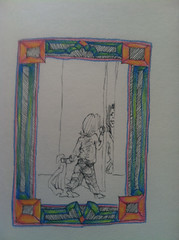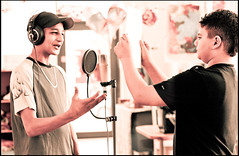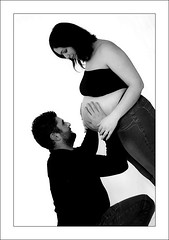Attention Deficit Hyperactivity Disorder (ADHD), is a condition that becomes apparent in some children in the preschool and early school years. It is hard for these children to control their behavior and/or pay attention.

It is estimated that between 3 and 5 percent of children have ADHD, or approximately 2 million children in the United States. This means that in a classroom of 25 to 30 children, it is likely that at least one will have ADHD.
Attention Deficit Hyperactivity Disordes
ADHD was first described by Dr. Heinrich Hoffman in 1845. A physician who wrote books on medicine and psychiatry, Dr. Hoffman was also a poet who became interested in writing for children when he couldn't find suitable materials to read to his 3-year-old son.
The result was a book of poems, complete with illustrations, about children and their characteristics. "The Story of Fidgety Philip" was an accurate description of a little boy who had attention deficit hyperactivity disorder.
Yet it was not until 1902 that Sir George F. Still published a series of lectures to the Royal College of Physicians in England in which he described a group of impulsive children with significant behavioral problems, caused by a genetic dysfunction and not by poor child rearing--children who today would be easily recognized as having ADHD. Since then, several thousand scientific papers on the disorder have been published, providing information on its nature, course, causes, impairments, and treatments.
A child with ADHD faces a difficult but not insurmountable task ahead. In order to achieve his or her full potential, he or she should receive help, guidance, and understanding from parents, guidance counselors, and the public education system. This document offers information on ADHD and its management, including research on medications and behavioral interventions, as well as helpful resources on educational options.
Because ADHD often continues into adulthood, this document contains a section on the diagnosis and treatment of ADHD in adults.
Symptoms
The principal characteristics of ADHD are inattention, hyperactivity, and impulsivity. These symptoms appear early in a child's life. Because many normal children may have these symptoms, but at a low level, or the symptoms may be caused by another disorder. It is important that the child receive a thorough examination and appropriate diagnosis by a well-qualified professional.
Symptoms of ADHD will appear over the course of many months, often with the symptoms of impulsiveness and hyperactivity preceding those of inattention. Which may not emerge for a year or more. Different symptoms may appear in different settings, depending on the demands the situation may pose for the child's self-control. A child who "can't sit still" or is otherwise disruptive will be noticeable in school, but the inattentive daydreamer may be overlooked.
The impulsive child who acts before thinking may be considered just a "discipline problem," while the child who is passive or sluggish may be viewed as merely unmotivated. Yet both may have different types of ADHD.
All children are sometimes restless, sometimes act without thinking, sometimes daydream the time away. When the child's hyperactivity, distractibility, poor concentration, or impulsivity begin to affect performance in school, social relationships with other children, or behavior at home, ADHD may be suspected. But because the symptoms vary so much across settings, ADHD is not easy to diagnose. This is especially true when inattentiveness is the primary symptom.
According to the most recent version of the Diagnostic and Statistical Manual of Mental Disorders2 (DSM-IV-TR), there are three patterns of behavior that indicate ADHD. People with ADHD may show several signs of being consistently inattentive. They may have a pattern of being hyperactive and impulsive far more than others of their age. Or they may show all three types of behavior.
This means that there are three subtypes of ADHD recognized by professionals. These are the predominantly hyperactive-impulsive type (that does not show significant inattention); the predominantly inattentive type (that does not show significant hyperactive-impulsive behavior) sometimes called ADD--an outdated term for this entire disorder; and the combined type (that displays both inattentive and hyperactive-impulsive symptoms).
Hyperactivity-Impulsivity
Hyperactive children always seem to be "on the go" or constantly in motion. They dash around touching or playing with whatever is in sight, or talk incessantly. Sitting still at dinner or during a school lesson or story can be a difficult task. They squirm and fidget in their seats or roam around the room. Or they may wiggle their feet, touch everything, or noisily tap their pencil. Hyperactive teenagers or adults may feel internally restless. They often report needing to stay busy and may try to do several things at once.
Impulsive children seem unable to curb their immediate reactions or think before they act. They will often blurt out inappropriate comments, display their emotions without restraint, and act without regard for the later consequences of their conduct.
Their impulsivity may make it hard for them to wait for things they want or to take their turn in games. They may grab a toy from another child or hit when they're upset. Even as teenagers or adults, they may impulsively choose to do things that have an immediate but small payoff rather than engage in activities that may take more effort yet provide much greater but delayed rewards.
Some signs of hyperactivity-impulsivity are:
Feeling restless, often fidgeting with hands or feet, or squirming while seated Running, climbing, or leaving a seat in situations where sitting or quiet behavior is expected
Blurting out answers before hearing the whole question
Having difficulty waiting in line or taking turns.
Inattention Children who are inattentive have a hard time keeping their minds on any one thing and may get bored with a task after only a few minutes. If they are doing something they really enjoy, they have no trouble paying attention. But focusing deliberate, conscious attention to organizing and completing a task or learning something new is difficult.
Homework is particularly hard for these children. They will forget to write down an assignment, or leave it at school. They will forget to bring a book home, or bring the wrong one. The homework, if finally finished, is full of errors and erasures. Homework is often accompanied by frustration for both parent and child.
The DSM-IV-TR gives these signs of inattention:
Often becoming easily distracted by irrelevant sights and sounds.
Often failing to pay attention to details and making careless mistakes.
Rarely following instructions carefully and completely losing or forgetting things like toys, or pencils, books, and tools needed for a task.
Often skipping from one uncompleted activity to another.
Children diagnosed with the Predominantly Inattentive Type of ADHD are seldom impulsive or hyperactive, yet they have significant problems paying attention. They appear to be daydreaming, "spacey," easily confused, slow moving, and lethargic.
They may have difficulty processing information as quickly and accurately as other children. When the teacher gives oral or even written instructions, this child has a hard time understanding what he or she is supposed to do and makes frequent mistakes. Yet the child may sit quietly, unobtrusively, and even appear to be working but not fully attending to or understanding the task and the instructions.
These children don't show significant problems with impulsivity and overactivity in the classroom, on the school ground, or at home. They may get along better with other children than the more impulsive and hyperactive types of ADHD. They may not have the same sorts of social problems so common with the combined type of ADHD. So often their problems with inattention are overlooked. But they need help just as much as children with other types of ADHD, who cause more obvious problems in the classroom.
Is It Really ADHD?
Not everyone who is overly hyperactive, inattentive, or impulsive has ADHD. Since most people sometimes blurt out things they didn't mean to say, or jump from one task to another, or become disorganized and forgetful, how can specialists tell if the problem is ADHD?
Because everyone shows some of these behaviors at times, the diagnosis requires that such behavior be demonstrated to a degree that is inappropriate for the person's age. The diagnostic guidelines also contain specific requirements for determining when the symptoms indicate ADHD.
The behaviors must appear early in life, before age 7, and continue for at least 6 months. Above all, the behaviors must create a real handicap in at least two areas of a person's life such as in the schoolroom, on the playground, at home, in the community, or in social settings. So someone who shows some symptoms but whose schoolwork or friendships are not impaired by these behaviors would not be diagnosed with ADHD. Nor would a child who seems overly active on the playground but functions well elsewhere receive an ADHD diagnosis.
To assess whether a child has ADHD, specialists consider several critical questions: Are these behaviors excessive, long-term, and pervasive? That is, do they occur more often than in other children the same age?
Are they a continuous problem, not just a response to a temporary situation? Do the behaviors occur in several settings or only in one specific place like the playground or in the schoolroom? The person's pattern of behavior is compared against a set of criteria and characteristics of the disorder as listed in the DSM-IV-TR.
Diagnosis
Some parents see signs of inattention, hyperactivity, and impulsivity in their toddler long before the child enters school. The child may lose interest in playing a game or watching a TV show, or may run around completely out of control.
But because children mature at different rates and are very different in personality, temperament, and energy levels, it's useful to get an expert's opinion of whether the behavior is appropriate for the child's age. Parents can ask their child's pediatrician, or a child psychologist or psychiatrist, to assess whether their toddler has an attention deficit hyperactivity disorder or is, more likely at this age, just immature or unusually exuberant.
ADHD may be suspected by a parent or caretaker or may go unnoticed until the child runs into problems at school. Given that ADHD tends to affect functioning most strongly in school, sometimes the teacher is the first to recognize that a child is hyperactive or inattentive and may point it out to the parents and/or consult with the school psychologist.
Because teachers work with many children, they come to know how "average" children behave in learning situations that require attention and self-control. However, teachers sometimes fail to notice the needs of children who may be more inattentive and passive yet who are quiet and cooperative, such as those with the predominantly inattentive form of ADHD.
Attention Deficit Hyperactivity Disorder













